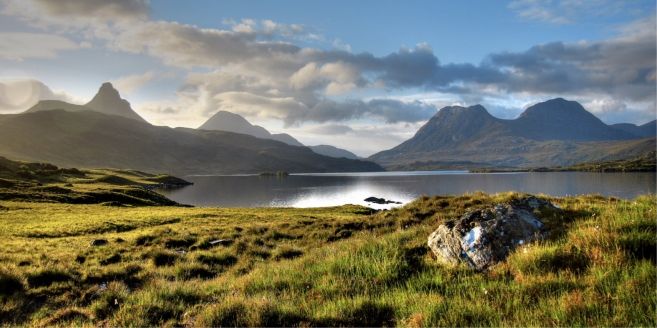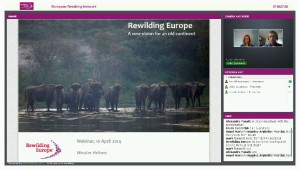The first experience sharing event organised by the European Rewilding Network took place on April 10. During the webinar, which as its name implies is a web-based seminar, many valuable experiences from rewilding were exchanged between members of the Network.

Within this online webinar room, the participants’ practical experience of rewilding covered more than a staggering half million hectares. The interactive webinar format made it possible for all of them to give, receive and discuss information in real time. Webinars are therefore considered very useful tools in order to actively share experiences, which is an important goal within the ERN.
This time, the main topics were reintroductions of large herbivore species, practical field experiences from that and species management. Two prepared presentations were also held on the subject.
Wouter Helmer, Rewilding director of Rewilding Europe, started by introducing the organisation’s vision on rewilding and the activities that it is involved in. From his position, one of the most valuable achievements so far from a nature conservation perspective is that “rewilding” as such is now being recognized not only by a large audience, but also by the European Commission and a number of independent foundations. Another important result that Wouter highlighted was that “obtaining grazing rights enables us to save important corridors for wildlife and secure large grazing zones for the large herbivores. Securing hunting and grazing rights in a more sustainable way seems to be a good policy, in order to change from existing management which in most cases is not very favourable for nature to management and non-intervention management which supports rewilding.”
The second presentation was done by João Quadrado, local coordinator of the Portuguese part of the Western Iberiarewilding area. Hepassed on his first-hand experiences by presenting a case study from the Faia Brava reserve. In this area some of the main activities include bringing back local primitive breeds like such as Garrano horses and Maronesa cattle. The cattle breed is part of the Tauros breeding programme which aims to bring back an animal that at closely as possible resembles and functions like the extinct aurochs. Furthermore, as one of the results so far, João told an interesting anecdote which links olive oil to buying land. When his organisation ATN bought a property in the Côa valley, it included already existing olive yards. They do not manage the site but pick the olives every year to produce organic olive oil. “The profit goes to our land acquisition fund and from there it flows directly to the purchase of land. So when someone buys a bottle, he is taking home a bottle of olive oil but moreover he really purchases a little bit more space for the Faia Brava reserve,” João explains.
 A wide variety of knowledge was present in the webinar room and information shared about specific subjects, like working together with hunting associations, the opportunities with the European Wildlife Bank and more in general how ERN network members could benefit from cooperating with Rewilding Europe. The attendees mostly worked in the field of large or medium-scale restoration of natural processes, pilot projects that focus on supporting one or more key wildlife species, and re-introductions and re-stockings of locally extinct or rare key wildlife species and breeds.
A wide variety of knowledge was present in the webinar room and information shared about specific subjects, like working together with hunting associations, the opportunities with the European Wildlife Bank and more in general how ERN network members could benefit from cooperating with Rewilding Europe. The attendees mostly worked in the field of large or medium-scale restoration of natural processes, pilot projects that focus on supporting one or more key wildlife species, and re-introductions and re-stockings of locally extinct or rare key wildlife species and breeds.
Currently, the European Rewilding Network comprises of thirty members from seventeen countries. It is an open network that encourages all inspirational rewilding initiatives from all over Europe to join. We are looking forward to the next experience-sharing webinar.
We welcome new members to join the Network, as building a large database of knowledge about many kinds of rewilding experiences will be useful to all of us while Making Europe a Wilder Place. Please feel welcome to have a look how your inspiring rewilding initiative can become part of this growing Network at www.rewildingeurope.com/rewilding-network/
